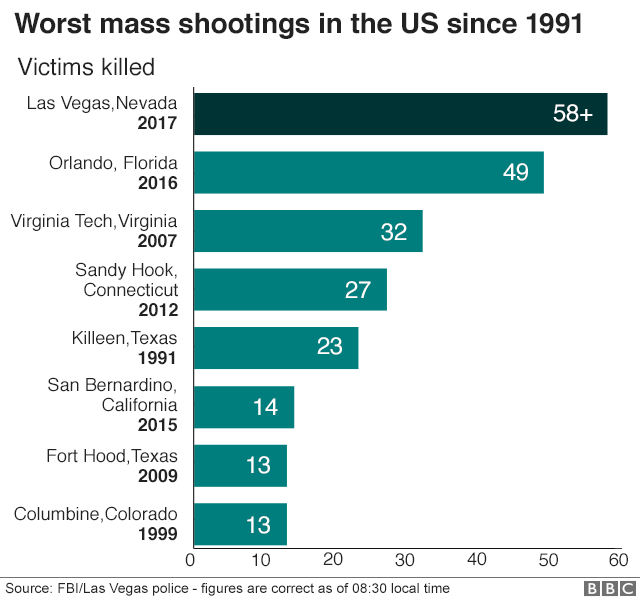At least 59 people have been killed and another 527 injured in a mass shooting at a Las Vegas concert.
A gunman, named as 64-year-old Nevada resident Stephen Paddock, opened fire from the 32nd floor of the Mandalay Bay Hotel towards an open-air music festival attended by 22,000.
He killed himself as police stormed the room where 10 guns were found.
Investigators have found no link to international terrorism, despite a claim from so-called Islamic State.
In an address from the White House, President Donald Trump described the attack as “pure evil”.
He praised the efforts of the emergency services, saying their “miraculous” speed saved lives, and announced he would be visiting Las Vegas on Wednesday.
With First Lady Melania by his side, he later observed a moment of silence on the White House lawn.
How did the attack unfold?
The final shows of the three-day Route 91 country music festival were in full swing when the gunman struck.
Thousands were enjoying a performance by top-billing singer Jason Aldean when the first of several bursts of automatic gunfire rang out – hundreds of shots, witnesses say. That was late on Sunday night – 22:08 local time (05:08 GMT on Monday).
Hundreds of concert-goers scrambled for cover, flattening themselves against the ground, rushing for the exits or helping others to escape as Paddock sprayed the site from his high vantage point.
“One man had blood all over him and that’s when I knew something was seriously wrong,” Mike Thompson from London, told the BBC.
“People were running and there was chaos.”
Concert-goer Mike McGarry, who survived, told Reuters he lay on top of his children when the shots rang out.
“They’re 20, I’m 53. I lived a good life,” he said.
Many hotels on the Las Vegas strip close to the scene were placed on police lockdown and parts of Las Vegas Boulevard were shut.
Aldean, who was rushed off-stage, shared his reaction on Instagram.
“Tonight has been beyond horrific,” he wrote.
Las Vegas police say the number of people injured stands at 515.
What do we know of the gunman?
Stephen Paddock, from a community of senior citizens in the small town of Mesquite north-east of Las Vegas, booked into the hotel on 28 September, police say.
His motives for carrying out the deadliest mass shooting in recent US history remain a mystery. Some investigators have suggested psychological issues, but there is no confirmation of this.
His brother, Eric, is dumbfounded that he acted this way.
Las Vegas Sheriff Joe Lombardo described the shooting as a “lone wolf” attack.
“We have no idea what his belief system was,” he said.
So-called Islamic State (IS) has claimed to be behind the attack, saying that Paddock had converted to Islam some months ago.
But the group provided no evidence for this and has made unsubstantiated claims in the past.
FBI Special Agent Aaron Rouse told a news conference: “We have determined at this point no connection to an international terrorist organisation.”
IS’s claim of responsibility for the Las Vegas attack is very unusual in that the perpetrator’s profile does not fit that of supporters or “soldiers” that the group has claimed in the past, writes Mina al-Lami, who monitors jihadist groups for the BBC.
If true, his suicide would be deemed wholly “un-Islamic”, she adds.
Jihadist suicides involve the assailant blowing himself up in order to kill those around him.
The investigation continues to gather pace, with searches at Paddock’s Mesquite home, where more weapons were found, and a second property.
Paddock lived in Mesquite with Marilou Danley. Police have interviewed her but say she does not appear to have been involved as she was out of the country. They are hoping to speak to her again.
Police say he used some of her identity documents to check in to the Mandalay Bay.
Who are the victims?
The authorities have yet to confirm the identities of any of the 58 killed.
Jordan McIldoon, 23, from British Columbia in Canada, has been identified as a victim of the attack by CBC News.
A nurse, Sonny Melton, of Big Sandy, Tennessee, has been named as another victim by The Jackson Sun newspaper.
In a Facebook post, his wife, Dr Heather Gulish Melton, said she “lost my true love and knight in shining armor. I appreciate the prayers but I just need some time.”
An off-duty Las Vegas police officer was another of those who died.
By the BBC’s James Cook in Las Vegas
The scenes which played out in this stunned city were at once frantically urgent and wearily familiar.
When gunfire rings out, Americans know the drill. Run.
They fled from a gunman who left a city in chaos.
For a time, Las Vegas looked and felt like a war zone. Hospitals were overwhelmed. There were not enough ambulances. A plea for blood donations echoed across the airwaves.
And now the mourning, the relief, the tears, the elation, the grief and a hundred other emotions are barely beginning.
Doctors are still battling to save lives.
For a Western democracy, the United States has seen an astonishing amount of horror like this.
But even for this country what happened here is carnage on a different scale.
America’s mass shooting disease now feels like a plague.

What gun laws does Nevada have?
Nevada has some of the least stringent gun laws in the United States.
People are allowed to carry weapons and do not have to register themselves as a gun-owner.
Background checks are done when people buy guns, but they are also allowed to sell them privately.
Former congresswoman Gabrielle Giffords, who survived a shooting six years ago, called for political leaders in Washington to introduce tougher gun laws following the Las Vegas attack.
Her husband Mark Kelly read out a joint statement on the steps of the Capitol saying thoughts and prayers from the White House were not enough to stop the next shooting.
Source: BBC


Comments are closed.